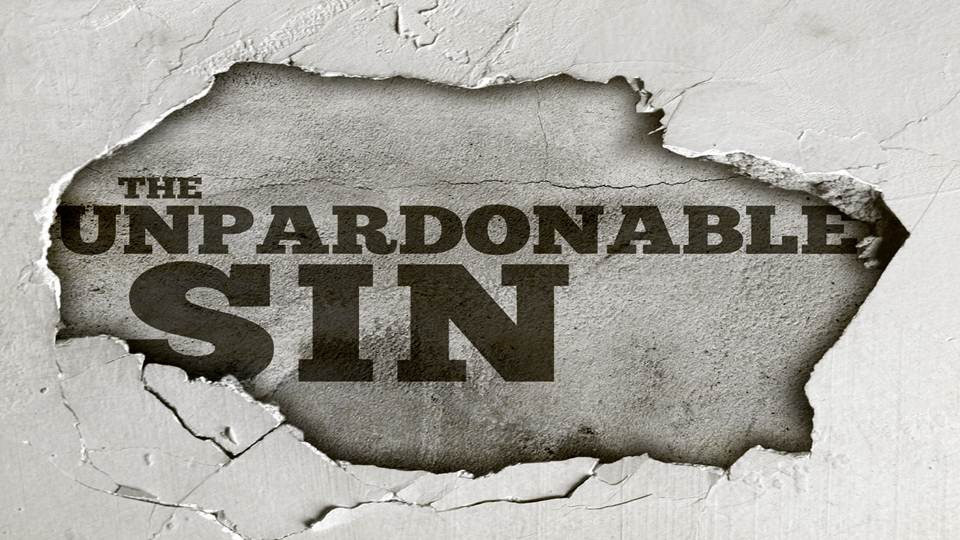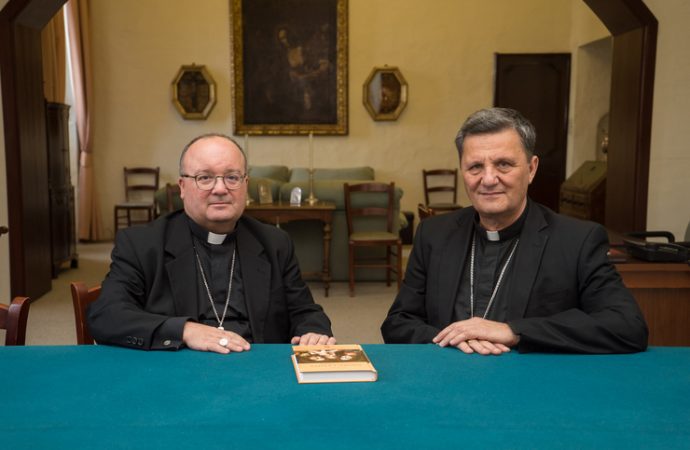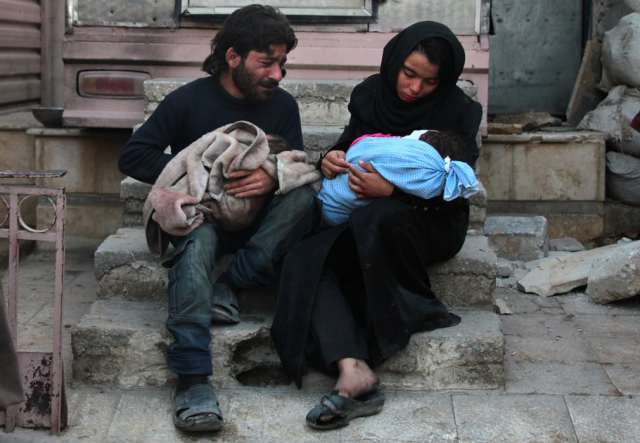As you know, in a monastery the monk–priests take turns as principal celebrants of the conventual Mass. At Douai most of us usually offer a few words of reflection, a homilette, of a greater or lesser degree of depth according to the monk involved. (nb depth is not always a virtue!) So this morning I was slated for the Mass, and I was struck by the gospel Mark 3:22–30:
The scribes who came down from Jerusalem said, “He has Beelzebul, and by the ruler of the demons he casts out demons.” And he called them to him, and spoke to them in parables, “How can Satan cast out Satan? If a kingdom is divided against itself, that kingdom cannot stand. And if a house is divided against itself, that house will not be able to stand. And if Satan has risen up against himself and is divided, he cannot stand, but his end has come. But no one can enter a strong man’s house and plunder his property without first tying up the strong man; then indeed the house can be plundered.
“Truly I tell you, people will be forgiven for their sins and whatever blasphemies they utter; but whoever blasphemes against the Holy Spirit can never have forgiveness, but is guilty of an eternal sin”— for they had said, “He has an unclean spirit.”
It is a dense and not particularly clear passage at first reading, or even second. But it merits extended reflection in light of the current crisis over the post-synodal apostolic exhortation, Amoris Laetitia.
A house divided against itself cannot stand… no one can plunder a strong man’s house without first tying him up, then it can be plundered… verbal blasphemies can be forgiven but the blasphemy against the Holy Spirit is an eternal sin and beyond forgiveness…

This does not seem to be what we would expect of the Jesus of mercy, at least the mercy that is the currency of much modern rhetoric both within and without the Church. Moreover, what a disconnected series of topics it seems to be. Yet, is it so incoherent and rambling as it might seem?
The blasphemies we utter, offences against God’s honour but repentable and forgiveable, with these we are familiar enough, and our working definition of blasphemy would probably alight here for most of us. However there is a second, deeper layer to blasphemy, a more existential and chronic one. Blasphemy can also entail denying God the responsibility for the good works he has done, or attributing to God some evil or other. This blasphemy is not the momentary blurtings of unguarded lips, but an ongoing attitude that refuses to allow God to be God, and God as he has revealed himself to us.
Thus, for example, there has been a temptation throughout the centuries to chip away at God’s moral law, not by changing the teaching but exalting it so high as to make it beyond our reach. So—it is not good for a man to be celibate, since God made Eve for Adam precisely that he might not be alone; so to impose celibacy on priests imposes on them an intolerable burden.
Clerical celibacy is not an ideal example as it is not universal moral law but a counsel of perfection. So let us move to marriage:
And Pharisees came up and in order to test Jesus asked, “Is it lawful for a man to divorce his wife?” He answered them, “What did Moses command you?” They said, “Moses allowed a man to write a certificate of divorce and to send her away.” And Jesus said to them, “Because of your hardness of heart he wrote you this commandment. But from the beginning of creation, ‘God made them male and female.’ ‘Therefore a man shall leave his father and mother and hold fast to his wife, and the two shall become one flesh.’ So they are no longer two but one flesh. What therefore God has joined together, let not man separate.”
And in the house the disciples asked him again about this matter. And he said to them, “Whoever divorces his wife and marries another commits adultery against her, and if she divorces her husband and marries another, she commits adultery.”
Mark 10:2–12
This is our Lord at his most unequivocal. God created marriage as a good, as a sacramental representation of the union of Christ with the Church, and forming an ecclesiola, an icon of the Church as the community of salvation which shares in and embodies that saving relationship. Even when marriage is difficult, even crushing, it embodies Christ’s love for us on the Cross. Before Christ divorce was permitted not because man was incapable in his nature of living in marriage with perfect fidelity—no, “God made them male and female” and joined them together. Marriage is hardwired into human nature. Divorce was permitted because of human sin, and before Christ there was no sure remedy for man that could free him from bondage to sin.
However, with Christ’s death on the Cross the perfect sacrifice at last was offered for human sin, ‘once for all’ as Hebrews proclaims in refrain, and so human nature was now able to be extricated from the bondage to sin that led to divorce. This new freedom, this Christian liberty, is possible because Christ has given us his Holy Spirit in Baptism and Confirmation, and its gifts and graces are renewed and revived in Confession and Holy Communion. By the gift of the Holy Spirit it is possible for us to live as Christ commands us, as he has guaranteed us the grace we need, as long as our will to do so abides.
So when some start twisting the admittedly woolier and imperfect parts of Amoris Laetitia to make the case for allowing civilly divorced and remarried Catholics to continue in a state that Christ calls adultery, and to allow them at the same time to receive Holy Communion, surely they commit a blasphemy against the Holy Spirit? Implicit in their approach is the assertion that some baptised and confirmed are somehow unable to live as Christ commanded, and that these people form an exception that charity, yea mercy, musty accommodate. If some, then potentially all are unable. Christ is made at best a liar, and at worst a tyrant in imposing on all humanity a precept some, apparently, cannot obey.
Do you see the blasphemy? Christ’s law on marriage is beyond us, even a burden to us, and so God is denied the good that he has done, and implicitly we attribute to God responsibility for the failure of some to live up to the teaching, because their natural state and even their re-created state after baptism and confirmation is still not able to live up to Christ’s commandments. So if that is how he has made us then we cannot be responsible for our failings. The gift of the Holy Spirit is not, then, really the gift that it is made out to be.
The blasphemy is compounded when those in such adulterous unions are effectively encouraged to remain in adultery, without the necessary requirement that they live as brother and sister, and yet still receive Holy Communion. Given St Paul’s inspired teaching on Holy Communion in 1 Corinthians 11, such an indulgence is an atrocity. It encourages such unhappy sinners to eat and drink judgment upon themselves. In effect, the libertines would have the adulterous eat and drink what would be for them only poison for their souls.
 The bishops of Malta: Archbishop Charles Scicluna (l) and Bishop Mario Grech
The bishops of Malta: Archbishop Charles Scicluna (l) and Bishop Mario Grech
It is hard to see how those such as the two bishops of Malta have become anything other than abetters of spiritual poisoning and blasphemers against the Holy Spirit. Our Lord’s judgment on those who persist in such a sin is clear. It is still hard to believe that they have one so. However, it seems they have.
Whoever causes one of these little ones who believe in me to sin, it would be better for him if a great millstone were hung around his neck and he were thrown into the sea.
Mark 9:42
Not my words, but Christ’s. But they still have to time to repent. So do we. Best not to waste it.
Tomorrow I escape to Australia for three weeks. Maybe the inquisitors will have moved on by the time I return.





